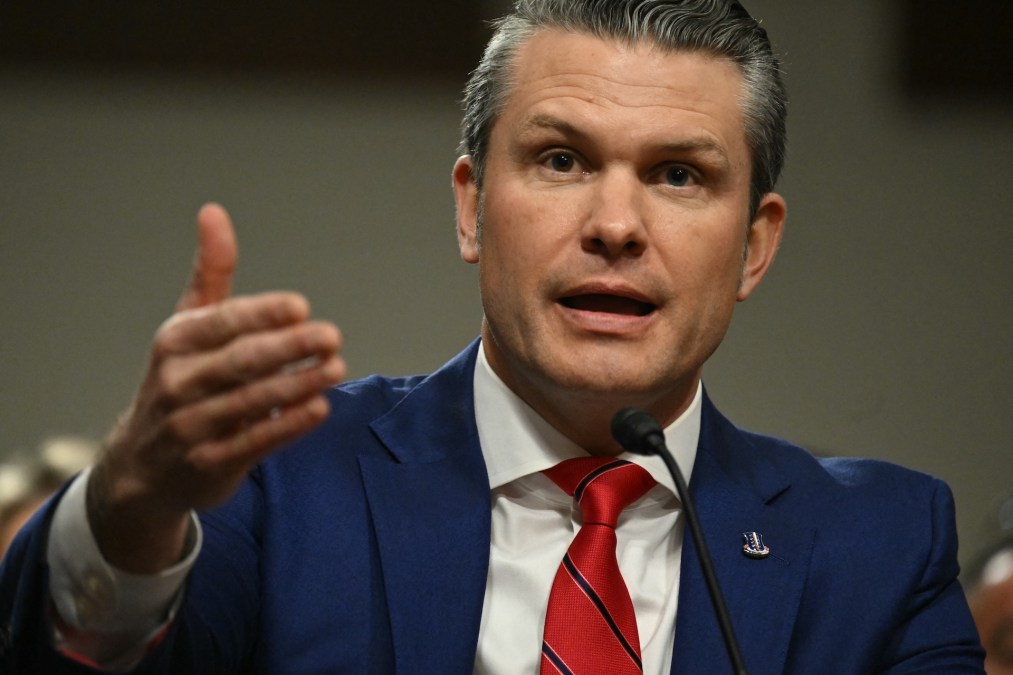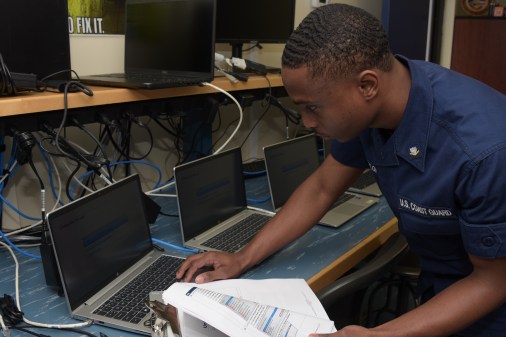Trump’s defense secretary nominee pledges to prioritize AI investments

Leading up to his Senate confirmation hearing Tuesday, Pete Hegseth — the network TV presenter who President-elect Donald Trump picked to serve as the next U.S. defense secretary — told lawmakers that he would move to modernize the Pentagon’s data and cyber infrastructure and enable AI adoption for a range of national security endeavors, if he’s approved for the high-stakes role.
DefenseScoop reviewed Hegseth’s answers to the Senate Armed Services Committee’s advanced policy questions (APQs) that were submitted to Congress ahead of his testimony.
While he doesn’t call out some of the most major contemporary technology-accelerating initiatives by name, Hegseth’s responses across the 75-page document offer an early look into his plans for the Pentagon if confirmed for Trump’s second term.
“The Department of Defense budget must focus on lethality and innovation, technology is changing the battlefield,” he wrote.
Across the correspondence, Hegseth repeatedly emphasizes his aims to shift the military and DOD workforces to operate with what he refers to as a more “lethal” and “warfighting-centric” mindset — via a variety of organizational and process-oriented reforms.
“We must identify, recruit, and empower the best talent, and manage our information effectively, enabled by modern tools such as AI/ML and data analytics, made available at the right time, and delivered to the right people,” the nominee wrote.
He pointed to the Pentagon’s Chief Digital and AI Office as one of the main players he would work with to identify opportunities and work to improve management processes across the Pentagon.
“If confirmed, I will commit to bringing modern management tools to the Department that allow my team to manage effectively with agility. This will include application of AI/ML capabilities, modernizing decision support tools from the boardroom to the battlefield, and further developing promising capabilities like [the CDAO’s ADVANA platform]. I will lead by example by requiring that my principal staff [assistants use] these tools to tee up decisions in our senior leadership forums,” Hegseth said in the APQ responses.
Recognizing AI capabilities as disruptive and vital to DOD’s success in the future, he pledged to prioritize it for multiple military activities and operations, including to monitor cyberspace, counter transnational criminal organizations and for weapons test and evaluation functions.
“Artificial Intelligence is a powerful set of capabilities that we must use as we know our adversaries, particularly China, have invested in such capabilities. Artificial Intelligence in the U.S. commercial sector is the most advanced in the world and we should take advantage of that as a basis for DOD’s specific needs,” Hegseth wrote.
He spotlighted his views that the Pentagon must better exploit private sector capital investments, talent and best practices — beginning with DOD’s Office of Strategic Capital and the Defense Innovation Unit. If confirmed, he said his team would evaluate their performances to “ensure maximum effectiveness.”
Hegseth also called for new acquisition reforms to make it easier for the department to adopt emerging technologies, and a more “clear-eyed assessment” about what should and shouldn’t be produced and steered by the DOD.
“The pace of innovation has fundamentally altered the battlefield, and our structure has not adapted to that yet,” Hegseth wrote.
Under the Biden administration, Pentagon leadership launched the high-profile Replicator initiative as a major military technology and procurement modernization effort in August 2023.
Hegseth’s responses don’t specifically mention Replicator, or indicate whether he would continue to prioritize its aims — at least in the first tranche — to help the military deploy thousands of “attritable autonomous systems” to deter China by August 2025.
However, he wrote that DOD “has only partially leveraged the potential of our defense industrial base and defense innovation base to cost-effectively deliver capabilities at the speed of relevance. Several initiatives have aimed to deliver proliferated, distributed, and attritable capabilities on short timelines, but more work needs to be done to shift the Department’s thinking away from developing expensive, exquisite platforms over many years that we cannot afford to lose, toward delivering innovation at scale on compressed cycles.”
Numerous inclusions in the APQ responses suggest the defense secretary nominee also plans to conduct a wide range of cyber- and technology-aligned policy reviews. He committed to assessing “DOD’s capability to effectively conduct military operations in the information environment,” and the military’s overarching force posture globally.
Hegseth is considered a controversial pick for the Pentagon’s top job. He’s been criticized for previous comments about the role of women in combat and the department’s diversity and equity initiatives.
He was also accused of sexual assault in 2017. He’s denied those allegations and no charges were filed in that case.
“Given my observations and experience throughout my career, if confirmed, I intend to make the United States military a warfighting-centric organization once again. This includes refocusing resources on readiness and the capabilities necessary to deter, fight, and prevail in conflict,” Hegseth told lawmakers.






